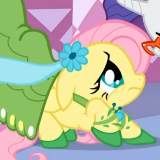Grammer a Week 22: Word Splits · 2:46am May 21st, 2016
This is Grammer a Week, the periodic blog program-thing where I soapbox about a grammar subject I find interesting. You might, too! This week's installment is about commonly confused words and whether they should be written as one or two. Onto vs. on to? Into vs. in to? Everyday vs. every day? There are dozens of these compound words that can either appear stuck together or separated by a space. Though some word pairs have the same meaning when stuck together, some are subtly different.
Onto vs. on to is a fairly simple distinction to make. "Onto" is formally a preposition and is the one you would probably be using most often. The only time you would use "on to" is if you wanted "on" to lump with the word before it, followed it with the preposition "to":
We pressed on to the castle. (We pressed on until we reached the castle.)
We walked onto the drawbridge. (We walked on the surface of the drawbridge.)
As a rule of thumb, if you can insert the word "up" before "onto," you're using the right form of the word:
We walked up onto the drawbridge.
The same general rules apply with into vs. in to:
Scootaloo walked into the schoolhouse.
She turned her hastily-written report in to Ms. Cheerilee.
Everyday vs. every day is similar. "Everyday" is a simple adjective, so you would use it to describe something that's perfunctory. "Every day" is an adjective followed by a noun, and it means something that's done, well, day after day:
Fluttershy went about her everyday routine every day.
As for something like nobody vs. no body, use "nobody" when you're using the word as a single indefinite pronoun. Use "no body" in the rare instances when you need to describe the absence of a carcass or something. Anything vs. any thing works the same way.
In that same vein, "everybody" and "everyone" are pronouns. Use only the split forms if you need to make explicit use of that adjective "every."
A lot vs alot? "A lot" is always correct. Please don't use "alot" unless you like writing your stories in chatspeak.
No one vs. noone? Same thing: regardless of usage, "no one" is always right. And "no-one" isn't acceptable either.
Any more vs. anymore? These are actually synonymous, though "any more" is considered the more formal of the two.
"Whatever," "whichever," "however," "whoever," and "whenever" are all correct on in their one-word forms.
On to (not onto!) some MLP specific word splits. According to knighty, when referring to this site, it's Fimfiction. Not FiMFiction, not FiM Fiction.
And here are a few names you must be sure that you get right, unless you want to be murdered by your readers. If you get the very names of your characters wrong, readers won't hold much hope that you got anything else right:
Fluttershy, not Flutter Shy.
Applejack, not Apple Jack.
Apple Bloom, not Applebloom. (How come so many authors get this one wrong?)
Sweetie Belle, not Sweetiebelle.
Fleur de Lis, not Fleurdelis or Fleur-de-lis. *
* The official name for this character is Fleur Dis Lee, but that name was christened after "Fleur de Lis" already made its way into the general fanon. At this point, you could use either form. The same thing happened with Carrot Top (Golden Harvest).
Thanks for reading! If you have any questions or comments, please post them below. I'm always open to suggestions for future Grammer a Week posts.



I don't know why, but "Apple Bloom" has always looked misspelled to me, as if it calls for a pronunciation with much more stress on "Bloom" that we hear in the show. I recognize that the end credits spell her in two words, but that doesn't make it look right to me. I try to cope by not writing about her in formal contexts.
This raises the question why I don't get the same impression from "Sweetie Belle". My best guess is because semantically "Bloom" and "Sweetie" feel like they're the modifiers of "Apple" and "Belle", so the natural pronunciation of a two-word phrase would put stress on the modifier -- which matches the show's pronunciation of Sweetie but not of 'Bloom.
Fleur de Lis is a curious case. The symbol on her cutie mark is generally known as a "fleur-de-lis" in English, with hyphens. The fandom naming with spaces instead (to which I do not object) must be influenced by French toponymic surnames that start with an uncapitalized "de".